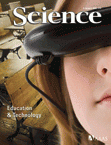May 06, 2009
Testing the effects of educational strategies on comprehension of a genomic concept using virtual reality
Testing the effects of educational strategies on comprehension of a genomic concept using virtual reality technology.
Patient Educ Couns. 2009 Apr 29;
Authors: Kaphingst KA, Persky S, McCall C, Lachance C, Loewenstein J, Beall AC, Blascovich J
OBJECTIVE: Applying genetic susceptibility information to improve health will likely require educating patients about abstract concepts, for which there is little existing research. This experimental study examined the effect of learning mode on comprehension of a genomic concept. METHODS: 156 individuals aged 18-40 without specialized knowledge were randomly assigned to either a virtual reality active learning or didactic learning condition. The outcome was comprehension (recall, transfer, mental models). RESULTS: Change in recall was greater for didactic learning than for active learning (p<0.001). Mean transfer and change in mental models were also higher for didactic learning (p<0.0001 and p<0.05, respectively). Believability was higher for didactic learning (p<0.05), while ratings for motivation (p<0.05), interest (p<0.0001), and enjoyment (p<0.0001) were higher for active learning, but these variables did not mediate the association between learning mode and comprehension. CONCLUSION: These results show that learning mode affects comprehension, but additional research is needed regarding how and in what contexts different approaches are best for educating patients about abstract concepts. PRACTICE IMPLICATIONS: Didactic, interpersonal health education approaches may be more effective than interactive games in educating patients about abstract, unfamiliar concepts. These findings indicate the importance of traditional health education approaches in emerging areas like genomics.
18:48 Posted in Virtual worlds | Permalink | Comments (0) | Tags: virtual reality, education
Jan 08, 2009
Science: special section on education and technology
The current issue of Science has a special section on the use of technology in education.
I found particularly interesting the article by Chris Dede about the potential offered by immersive interfaces for learning. According to Dede, the key benefit of immersive media is their ability to combine actional, symbolic, and perceptual factors, providing the participant with the impression that she or he is "inside" a digitally enhanced setting.
In another article included in this special issue, Merrilea Mayo reviews the most promising applications of videogames in science and technology education, and describes the challenges to be faced for the wider adoption of this approach.

11:14 Posted in Serious games | Permalink | Comments (0) | Tags: serious games, virtual reality, education






